-
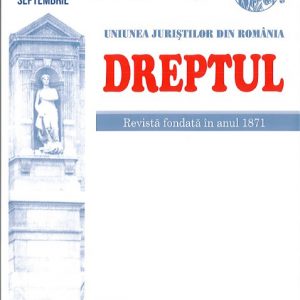 The attributions that confer substance to the activity of the prosecutor before the jurisdictional body are the participation in the trial of the criminal and civil cases, the exercise of the means of appeal against the judgments, the examination of the cases of non-uniform application of the law and the analysis of the cases in which the courts have delivered final judgments of acquittal, return or referral to the prosecutor. In criminal matters, the prosecutor mandatorily participates in the trial, under the sanction of absolute nullity, in the cases where the law expressly provides for his participation, and optionally, in cases other than those in which the law establishes the obligativity of participation. In civil matters, the rule is that the prosecutor takes part in the trial optionally, when he considers it necessary to defend the rule of law, the rights and interests of citizens. By way of exception, the prosecutor mandatorily participates in the trial of the civil cases when the obligativity is expressly provided. In criminal matters, the law opens for the prosecutor the path to exercise all means of appeal, ordinary (appeal, contestation) or extraordinary (recourse in cassation, contestation for annulment, revision), against various judgments. In civil matters, the prosecutor may exercise the means of appeal when he deems it is necessary to protect the rights and legitimate interests of minors, of the persons placed under interdiction and of the missing persons, or when he has participated in the trial of the case.
The attributions that confer substance to the activity of the prosecutor before the jurisdictional body are the participation in the trial of the criminal and civil cases, the exercise of the means of appeal against the judgments, the examination of the cases of non-uniform application of the law and the analysis of the cases in which the courts have delivered final judgments of acquittal, return or referral to the prosecutor. In criminal matters, the prosecutor mandatorily participates in the trial, under the sanction of absolute nullity, in the cases where the law expressly provides for his participation, and optionally, in cases other than those in which the law establishes the obligativity of participation. In civil matters, the rule is that the prosecutor takes part in the trial optionally, when he considers it necessary to defend the rule of law, the rights and interests of citizens. By way of exception, the prosecutor mandatorily participates in the trial of the civil cases when the obligativity is expressly provided. In criminal matters, the law opens for the prosecutor the path to exercise all means of appeal, ordinary (appeal, contestation) or extraordinary (recourse in cassation, contestation for annulment, revision), against various judgments. In civil matters, the prosecutor may exercise the means of appeal when he deems it is necessary to protect the rights and legitimate interests of minors, of the persons placed under interdiction and of the missing persons, or when he has participated in the trial of the case. -
 Are separate opinions necessary? Writing them involves both time and resources, and the result does not influence the causes in which they were formulated. In this context, the logical question is why some national and international judges choose to formulate such opinions. We appreciate that the main reason is the potential of these opinions to contribute to the development of the future judicial practice. The aim of this study is to emphasize the importance and benefits of regulating the separate opinions in national legislation and to encourage their use. In this study we aim to analyze the purpose of the separate opinions along with the arguments for and against their regulation in national legislations. We will also analyze the difference between separate and concurring opinions, but also the different result that these opinions may have. We will also address the issue of the style in which these opinions are written and the impact it may have on future case law. A distinct part of this paper will be devoted to the analysis of separate opinions in national courts. At the same time, we will follow if there are differences between the constitutional court and the common law courts, regarding the use of these opinions. At the end of the study, we will make some proposals de lege ferenda on the need for legislative development of the field of separate and concurring opinions, development which would encourage their use and, at the same time, would limit the purpose of using these opinions to the development of the case law.
Are separate opinions necessary? Writing them involves both time and resources, and the result does not influence the causes in which they were formulated. In this context, the logical question is why some national and international judges choose to formulate such opinions. We appreciate that the main reason is the potential of these opinions to contribute to the development of the future judicial practice. The aim of this study is to emphasize the importance and benefits of regulating the separate opinions in national legislation and to encourage their use. In this study we aim to analyze the purpose of the separate opinions along with the arguments for and against their regulation in national legislations. We will also analyze the difference between separate and concurring opinions, but also the different result that these opinions may have. We will also address the issue of the style in which these opinions are written and the impact it may have on future case law. A distinct part of this paper will be devoted to the analysis of separate opinions in national courts. At the same time, we will follow if there are differences between the constitutional court and the common law courts, regarding the use of these opinions. At the end of the study, we will make some proposals de lege ferenda on the need for legislative development of the field of separate and concurring opinions, development which would encourage their use and, at the same time, would limit the purpose of using these opinions to the development of the case law. -
 In this study, the author explains the concepts of: structure of the registered capital; general pledge of the creditors; registered capital; difference between the registered capital and the patrimony of the company; difference between the registered capital and the equity capital (net assets); difference between the registered capital and the value of the company, as well as the problems of the legal regime of social contributions after payments, as all of the above follow from the Law No 31/1990 (republished) on companies.
In this study, the author explains the concepts of: structure of the registered capital; general pledge of the creditors; registered capital; difference between the registered capital and the patrimony of the company; difference between the registered capital and the equity capital (net assets); difference between the registered capital and the value of the company, as well as the problems of the legal regime of social contributions after payments, as all of the above follow from the Law No 31/1990 (republished) on companies. -
 In the practice of the courts in our country the punishment imposed for the offence of unintentional killing is, in most cases, imprisonment with suspended execution, even in the situations where the guilt rests solely on the offender or when there are several victims, a fact which can call into question the manner in which the principles governing the individualization of punishments are implemented, whereas, by imposing excessively lenient punishments, in relation to the seriousness of the facts, the desideratum concerning the educational and preventive role thereof is not achieved.
In the practice of the courts in our country the punishment imposed for the offence of unintentional killing is, in most cases, imprisonment with suspended execution, even in the situations where the guilt rests solely on the offender or when there are several victims, a fact which can call into question the manner in which the principles governing the individualization of punishments are implemented, whereas, by imposing excessively lenient punishments, in relation to the seriousness of the facts, the desideratum concerning the educational and preventive role thereof is not achieved. -
 The voting right of the shareholder at the general meeting of the shareholders is an accessory right to the ownership of the shares, by which the shareholder protects his interests and exercises the supervision and control over the management of the company. It is a true prerogative of the shareholder’s access to the substantiation of business decisions, which materialize through the will of the company. The exercise of the right to vote is governed by the principle of good faith and the principle of proportionality, but may be limited in the situation of the conflict of interests between the shareholder and the company. The shareholder in conflict of interests with the company is obliged to abstain from the vote, if by his vote it contributes to the formation of the majority of a decision with harmful consequences for the company. The situation of conflict of interests and the sanction of non-observance of the obligation to abstain from voting cannot be determined by the other shareholders, but only by the court. If, through the decision adopted with the participation of the shareholder in conflict of interests, a prejudice has occurred, the applicable sanction is the commitment of its liability. Such a decision is valid, but it can also be cancelled, provided that it is the result of a majority abuse. The same fate has the decision adopted by the minority shareholders with the abusive removal of the shareholder’s vote supposed to be in conflict of interests.
The voting right of the shareholder at the general meeting of the shareholders is an accessory right to the ownership of the shares, by which the shareholder protects his interests and exercises the supervision and control over the management of the company. It is a true prerogative of the shareholder’s access to the substantiation of business decisions, which materialize through the will of the company. The exercise of the right to vote is governed by the principle of good faith and the principle of proportionality, but may be limited in the situation of the conflict of interests between the shareholder and the company. The shareholder in conflict of interests with the company is obliged to abstain from the vote, if by his vote it contributes to the formation of the majority of a decision with harmful consequences for the company. The situation of conflict of interests and the sanction of non-observance of the obligation to abstain from voting cannot be determined by the other shareholders, but only by the court. If, through the decision adopted with the participation of the shareholder in conflict of interests, a prejudice has occurred, the applicable sanction is the commitment of its liability. Such a decision is valid, but it can also be cancelled, provided that it is the result of a majority abuse. The same fate has the decision adopted by the minority shareholders with the abusive removal of the shareholder’s vote supposed to be in conflict of interests. -
 The article proposes a sensitive topic in the Romanian criminal procedure, namely to determine the extent to which the cases of absolute nullity are limitatively provided by the Criminal Procedure Code (Article 281 of the Criminal Procedure Code) or whether there are cases of nullity of the processual or procedural documents which, although not included in the enumeration of Article 281 of the Criminal Procedure Code, are, however, veritable cases of absolute nullity. The problem is all the more delicate since the national doctrine is situated, up to this moment, in the comfort zone in which the cases of absolute nullity are equated to those of express nullity and those of relative nullity to those of virtual nullity. I have shown, with examples from the practice, but also from the doctrine (too timid so far), that there are situations of virtual absolute nullity of the criminal processual acts not even listed in the content of Article 281 of the Criminal Procedure Code, as well as the situations in which they may become incidental.
The article proposes a sensitive topic in the Romanian criminal procedure, namely to determine the extent to which the cases of absolute nullity are limitatively provided by the Criminal Procedure Code (Article 281 of the Criminal Procedure Code) or whether there are cases of nullity of the processual or procedural documents which, although not included in the enumeration of Article 281 of the Criminal Procedure Code, are, however, veritable cases of absolute nullity. The problem is all the more delicate since the national doctrine is situated, up to this moment, in the comfort zone in which the cases of absolute nullity are equated to those of express nullity and those of relative nullity to those of virtual nullity. I have shown, with examples from the practice, but also from the doctrine (too timid so far), that there are situations of virtual absolute nullity of the criminal processual acts not even listed in the content of Article 281 of the Criminal Procedure Code, as well as the situations in which they may become incidental. -
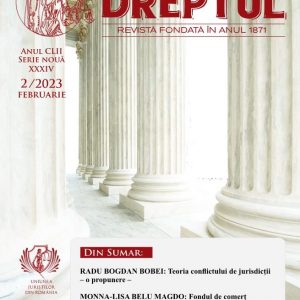
-
 As expected, sanctions and solutions covered by the Code of Civil Procedure of 1865 were taken over by Law no. 134/2010 regarding the Code of Civil Procedure (republished) entering into force on February 1, 2013. In this regard, fines, voidness, decay, obsolescence, application rejection or accept are regulated. The latest law also establishes new sanctions and solutions, some of them unusual: closing the case, out of trial, trial settlement, ignoring, remaining ineffective.
As expected, sanctions and solutions covered by the Code of Civil Procedure of 1865 were taken over by Law no. 134/2010 regarding the Code of Civil Procedure (republished) entering into force on February 1, 2013. In this regard, fines, voidness, decay, obsolescence, application rejection or accept are regulated. The latest law also establishes new sanctions and solutions, some of them unusual: closing the case, out of trial, trial settlement, ignoring, remaining ineffective. -
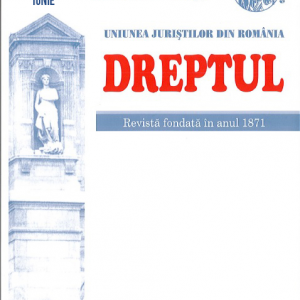 Recent legislative interventions have brought important innovations on mediation, and one of them has promoted the sanction of dismissing the claim as inadmissible in case of claimant’s failure to observe the obligation to participate in the briefing on the advantages of mediation. The author determines the conditions for applying this procedural sanction, which he considers extremely severe and even excessive. Inadmissibility for not participating in the briefing is being also examined in the light of the provisions of art. 21 of the Romanian Constitution, regarding the free access to justice and the provisions of art. 6 of the (European) Convention on Human Rights and Fundamental Freedoms. Secondly, the author notes that the sanction of inadmissibility applies only to the claimant. He believes, however, that the respondent may be subject to a judicial fine should he/she fail to appear in the briefing, according to Art. 187 item 1 letter f) of the new (Romanian) Code of Civil Procedure entered into force on February 15, 2013.
Recent legislative interventions have brought important innovations on mediation, and one of them has promoted the sanction of dismissing the claim as inadmissible in case of claimant’s failure to observe the obligation to participate in the briefing on the advantages of mediation. The author determines the conditions for applying this procedural sanction, which he considers extremely severe and even excessive. Inadmissibility for not participating in the briefing is being also examined in the light of the provisions of art. 21 of the Romanian Constitution, regarding the free access to justice and the provisions of art. 6 of the (European) Convention on Human Rights and Fundamental Freedoms. Secondly, the author notes that the sanction of inadmissibility applies only to the claimant. He believes, however, that the respondent may be subject to a judicial fine should he/she fail to appear in the briefing, according to Art. 187 item 1 letter f) of the new (Romanian) Code of Civil Procedure entered into force on February 15, 2013. -
 In this study, by an inductive method, we will try to address the problem, the solution and the arguments that could be found in certain situations where there is a disagreement between the category of use of a land classified as forest and its actual legal situation, disagreement which unreasonably generates limitations of the right to build on the land in question. In case a land has mentioned in the title of property the category of use „Forest” (Pd), but this land does not actually meet the legal conditions provided by Articles 1, 2, 19 (1) and Article 20 (2) of the Law No 46/2008 on the Forest Code in order to be considered forest, in order to be part of the national forest fund and in order to be mandatorily subject to the regime of a forest arrangement, then this land must be considered only a land with forest vegetation outside the national forest fund or a simple land not subject in any way to the provisions of the Law No 46/2008 on the Forest Code, for which it is possible to request the change of the category of use according to Article 24 (1) and (2) of the Law No 46/2008 on the Forest Code.
In this study, by an inductive method, we will try to address the problem, the solution and the arguments that could be found in certain situations where there is a disagreement between the category of use of a land classified as forest and its actual legal situation, disagreement which unreasonably generates limitations of the right to build on the land in question. In case a land has mentioned in the title of property the category of use „Forest” (Pd), but this land does not actually meet the legal conditions provided by Articles 1, 2, 19 (1) and Article 20 (2) of the Law No 46/2008 on the Forest Code in order to be considered forest, in order to be part of the national forest fund and in order to be mandatorily subject to the regime of a forest arrangement, then this land must be considered only a land with forest vegetation outside the national forest fund or a simple land not subject in any way to the provisions of the Law No 46/2008 on the Forest Code, for which it is possible to request the change of the category of use according to Article 24 (1) and (2) of the Law No 46/2008 on the Forest Code. -
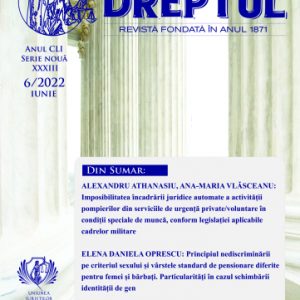
-
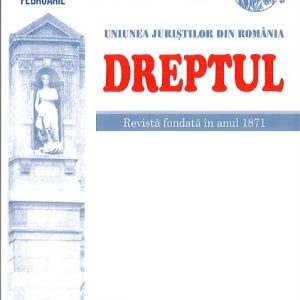 The article proposes procedural solutions, in compliance with the requirements of the ECHR practice, when changing the legal classification given to the deed, in appeal, by appreciating that the change in the legal classification given to the deed by the act of referral can be made by an undeniable conclusion, prior to the debate on the appeal, or by the conclusion for reinstating the case on the list of cases, provided that the court has debated the appeal, pending further ruling also for the reason concerning the change in the legal classification, which it found to be well-grounded.
The article proposes procedural solutions, in compliance with the requirements of the ECHR practice, when changing the legal classification given to the deed, in appeal, by appreciating that the change in the legal classification given to the deed by the act of referral can be made by an undeniable conclusion, prior to the debate on the appeal, or by the conclusion for reinstating the case on the list of cases, provided that the court has debated the appeal, pending further ruling also for the reason concerning the change in the legal classification, which it found to be well-grounded. -
 Potrivit art. 320 C.pr.pen., dacã pânã la începerea cercetãrii judecãtorești inculpatul declarã personal sau prin înscris autentic cã recunoaște sãvârșirea faptelor reținute în actul de sesizare a instanței și solicitã ca judecata sã se facã în baza probelor administrate în faza de urmãrire penalã, instanța va pronunța condamnarea inculpatului, care beneficiazã de reducerea cu o treime a limitelor de pedeapsã prevãzute de lege, în cazul pedepsei închisorii…
Potrivit art. 320 C.pr.pen., dacã pânã la începerea cercetãrii judecãtorești inculpatul declarã personal sau prin înscris autentic cã recunoaște sãvârșirea faptelor reținute în actul de sesizare a instanței și solicitã ca judecata sã se facã în baza probelor administrate în faza de urmãrire penalã, instanța va pronunța condamnarea inculpatului, care beneficiazã de reducerea cu o treime a limitelor de pedeapsã prevãzute de lege, în cazul pedepsei închisorii… -
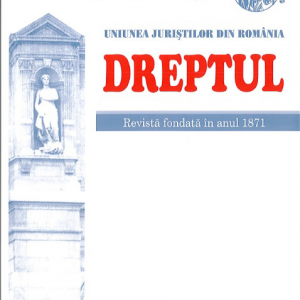 The present study aims at analyzing the new legal provisions regarding the country’s minimum gross salary guaranteed in payment. Recently, through a series of normative acts, the legislator renounced the old approach to the regulation of the minimum gross national salary guaranteed in payment, setting minimum differentiated salaries for certain categories of employees. Thus, employees with higher education and those with a minimum length of work will have a higher level of salary compared to the minimum gross salary guaranteed in payment. Moreover, the legislator set a higher threshold for the minimum wage in the construction sector, which benefits the employees of this sector of activity. This change of optics requires an analysis of its legality and timeliness. In order to outline the conclusions, there will be analyzed the internal sources, the provisions of ILO Convention No 131/1970 concerning Minimum wage fixing, with special reference to developing countries, and similar provisions in the field of minimum wage in different states.
The present study aims at analyzing the new legal provisions regarding the country’s minimum gross salary guaranteed in payment. Recently, through a series of normative acts, the legislator renounced the old approach to the regulation of the minimum gross national salary guaranteed in payment, setting minimum differentiated salaries for certain categories of employees. Thus, employees with higher education and those with a minimum length of work will have a higher level of salary compared to the minimum gross salary guaranteed in payment. Moreover, the legislator set a higher threshold for the minimum wage in the construction sector, which benefits the employees of this sector of activity. This change of optics requires an analysis of its legality and timeliness. In order to outline the conclusions, there will be analyzed the internal sources, the provisions of ILO Convention No 131/1970 concerning Minimum wage fixing, with special reference to developing countries, and similar provisions in the field of minimum wage in different states. -
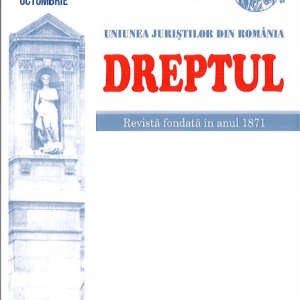 The author examines synthetically the changes brought to the institutional structure of the European Union by the Treaty of Lisbon. For this purpose, the author presents the essential institutional changes brought to: the European Parliament; the European Council; the Council; the European Commission (the Commission); the Court of Justice of the European Union.
The author examines synthetically the changes brought to the institutional structure of the European Union by the Treaty of Lisbon. For this purpose, the author presents the essential institutional changes brought to: the European Parliament; the European Council; the Council; the European Commission (the Commission); the Court of Justice of the European Union. -
 In respect of the contract of transport, the provisions of the new Romanian Civil Code in the matter (Articles 1955–2008) have the nature of general law, which, as the case may be, is supplemented by the special legislation, specific to each type of transport (rail, naval, road, air). Considering the above, this study makes an analysis of the provisions of the new Civil Code referring to a limited aspect, namely a summary on the rules of this Code, with reference to the civil-contractual liability of the transporter in the contract of transport of goods.
In respect of the contract of transport, the provisions of the new Romanian Civil Code in the matter (Articles 1955–2008) have the nature of general law, which, as the case may be, is supplemented by the special legislation, specific to each type of transport (rail, naval, road, air). Considering the above, this study makes an analysis of the provisions of the new Civil Code referring to a limited aspect, namely a summary on the rules of this Code, with reference to the civil-contractual liability of the transporter in the contract of transport of goods. -
 Întrebarea pe care ne-o punem cu toții este cum să construim o societate a bunăstării, în care să domnească cel puțin o bună înțelegere și toleranța, o societate non-agresivă, dacă o societate consensuală nu este posibilă. Răspunsul ar putea fi preferința pentru dialog; deci este necesară crearea de instituții și proceduri care prin mijloace juridice să asigure consolidarea democrației. Revizuirea Constituției este o importantă pârghie pentru a se atinge acest scop. Buna guvernare și consolidarea statului de drept se pot obține prin amplificarea rolului dreptului în sistemul politic statal, astfel încât democrația și o participare publică reală la formularea și adoptarea actelor normative secundare și chiar terțiare să fie consacrate prin norme juridice constituționale.
Întrebarea pe care ne-o punem cu toții este cum să construim o societate a bunăstării, în care să domnească cel puțin o bună înțelegere și toleranța, o societate non-agresivă, dacă o societate consensuală nu este posibilă. Răspunsul ar putea fi preferința pentru dialog; deci este necesară crearea de instituții și proceduri care prin mijloace juridice să asigure consolidarea democrației. Revizuirea Constituției este o importantă pârghie pentru a se atinge acest scop. Buna guvernare și consolidarea statului de drept se pot obține prin amplificarea rolului dreptului în sistemul politic statal, astfel încât democrația și o participare publică reală la formularea și adoptarea actelor normative secundare și chiar terțiare să fie consacrate prin norme juridice constituționale. -
 In this study, the author provides a critical analysis of the content of art. 2322 of the Civil Code that has entered into force on 1 October 2011, regulating for the first time, in terms of legislation, autonomous guarantee instrument of the letter of comfort. Given the lack of doctrinal explanations and of the Romanian jurisprudence in this regard, the author makes a comparative law analysis regarding the use of this instrument, employing as reference points the Common Law systems and Continental Law systems based on the existence of a Civil Code. This instrument is known since the early 1960s by the international transactions practice, but the corresponding case law is quite limited and in some legislation, although frequently used, letters of comfort are not subject to an expressis verbis legislative regulation. The author emphasizes the Romanian Civil Code modern nature together with the call for a consistent use, in practice, of this legal institution.
In this study, the author provides a critical analysis of the content of art. 2322 of the Civil Code that has entered into force on 1 October 2011, regulating for the first time, in terms of legislation, autonomous guarantee instrument of the letter of comfort. Given the lack of doctrinal explanations and of the Romanian jurisprudence in this regard, the author makes a comparative law analysis regarding the use of this instrument, employing as reference points the Common Law systems and Continental Law systems based on the existence of a Civil Code. This instrument is known since the early 1960s by the international transactions practice, but the corresponding case law is quite limited and in some legislation, although frequently used, letters of comfort are not subject to an expressis verbis legislative regulation. The author emphasizes the Romanian Civil Code modern nature together with the call for a consistent use, in practice, of this legal institution. -
 In this paper, the author analyzes the functional competence of the hierarchically superior prosecutor to carry out criminal prosecution acts in criminal files investigated by the criminal investigation bodies whose supervision is exercised by the prosecutor within the prosecutor’s office. For this purpose, a first starting point is the Criminal Procedure Code, which regulates the judicial function of criminal prosecution in criminal trial, respectively the competence of the prosecutor in performing this function, but references are also made to the Internal Regulation of the prosecutor’s offices of 14 November 2019, to the case law of the Constitutional Court of Romania in the matter, but also to the principle of the hierarchical control that governs the activity within the Public Ministry, principle with constitutional rank, regulated by the provisions of Articles 131–132 of the Constitution. The conclusion reached after presenting a pertinent argumentation is that the hierarchically superior prosecutor does not have the functional competence to lead and supervise the activity of the criminal investigation bodies, which is carried out within the criminal files assigned to the subordinated prosecutors, considering his quality of chief prosecutor.
In this paper, the author analyzes the functional competence of the hierarchically superior prosecutor to carry out criminal prosecution acts in criminal files investigated by the criminal investigation bodies whose supervision is exercised by the prosecutor within the prosecutor’s office. For this purpose, a first starting point is the Criminal Procedure Code, which regulates the judicial function of criminal prosecution in criminal trial, respectively the competence of the prosecutor in performing this function, but references are also made to the Internal Regulation of the prosecutor’s offices of 14 November 2019, to the case law of the Constitutional Court of Romania in the matter, but also to the principle of the hierarchical control that governs the activity within the Public Ministry, principle with constitutional rank, regulated by the provisions of Articles 131–132 of the Constitution. The conclusion reached after presenting a pertinent argumentation is that the hierarchically superior prosecutor does not have the functional competence to lead and supervise the activity of the criminal investigation bodies, which is carried out within the criminal files assigned to the subordinated prosecutors, considering his quality of chief prosecutor. -
 The provisions of Article 320 of the Law No 95/2006 on health reform have raised serious problems of interpretation in judicial practice. The question has therefore been raised as to whether persons who have suffered physical injury may be required to pay their hospital costs of hospitalization and medical treatment in the healthcare facilities concerned, where the author of the injury has not been identified or the injured party does not disclose his identity, or where he is simply not liable for criminal action. The question was also raised as to whether the injured party had failed to make or withdraw his plea or had the parties reconciled or not committed the offense claimed.
The provisions of Article 320 of the Law No 95/2006 on health reform have raised serious problems of interpretation in judicial practice. The question has therefore been raised as to whether persons who have suffered physical injury may be required to pay their hospital costs of hospitalization and medical treatment in the healthcare facilities concerned, where the author of the injury has not been identified or the injured party does not disclose his identity, or where he is simply not liable for criminal action. The question was also raised as to whether the injured party had failed to make or withdraw his plea or had the parties reconciled or not committed the offense claimed. -

-
 Democrația ca formă de organizare și de conducere a societății trebuie să se adapteze la noile realități impuse de tehnologia digitală, mai ales printr-un anumit tip de revoluție educativă și culturală în serviciul utilizatorilor. Așadar, democrația în epoca digitală presupune, în primul rând, recunoașterea unui drept fundamental de acces la spațiul digital pentru a se evita în acest mod riscurile unei rupturi digitale, în sensul utilizării acestuia de un număr restrâns de oameni – o elită cibernetică –, implicând toate avantajele ce ar rezulta pentru aceasta din folosirea rețelelor de informare și de comunicare, cum ar fi, de pildă, internetul. Prin urmare, beneficiile unei societăți cibernetice nu sunt reale decât dacă instrumentele informatice sunt pe larg difuzate și puse la dispoziția unui număr cât mai mare de indivizi umani. Într-adevăr, o e-democrație sau o e-administrație nu vor fi inovații relevante decât dacă un număr foarte mare de cetățeni va avea acces facil la acestea.
Democrația ca formă de organizare și de conducere a societății trebuie să se adapteze la noile realități impuse de tehnologia digitală, mai ales printr-un anumit tip de revoluție educativă și culturală în serviciul utilizatorilor. Așadar, democrația în epoca digitală presupune, în primul rând, recunoașterea unui drept fundamental de acces la spațiul digital pentru a se evita în acest mod riscurile unei rupturi digitale, în sensul utilizării acestuia de un număr restrâns de oameni – o elită cibernetică –, implicând toate avantajele ce ar rezulta pentru aceasta din folosirea rețelelor de informare și de comunicare, cum ar fi, de pildă, internetul. Prin urmare, beneficiile unei societăți cibernetice nu sunt reale decât dacă instrumentele informatice sunt pe larg difuzate și puse la dispoziția unui număr cât mai mare de indivizi umani. Într-adevăr, o e-democrație sau o e-administrație nu vor fi inovații relevante decât dacă un număr foarte mare de cetățeni va avea acces facil la acestea. -
 The change of vision brought by the new Civil Code in re ation to the partition contract requires an examination more attuned to the practical aspect. This study shows that, due to the fiscal taxation and the problem of the community regime of spouses, it shouldn’t be indifferent to us the translative effect of the partition contract. The transition from the declarative effect has clearly intended to provide a more coherent system in regard to certain issues like the fate of deeds closed by a co-owner over the whole property as well as the guarantee for eviction and defects. However, we tried to state that the retroactivity of the declarative system provided as well palpable benefits for the person seeking to enter into a partition by mutual agreement. Also, in the final part of this study we provided some details regarding the conditions for registration in the land book of the legal hypothecation stipuled for the previous co-owner regarding the debt from eviction.
The change of vision brought by the new Civil Code in re ation to the partition contract requires an examination more attuned to the practical aspect. This study shows that, due to the fiscal taxation and the problem of the community regime of spouses, it shouldn’t be indifferent to us the translative effect of the partition contract. The transition from the declarative effect has clearly intended to provide a more coherent system in regard to certain issues like the fate of deeds closed by a co-owner over the whole property as well as the guarantee for eviction and defects. However, we tried to state that the retroactivity of the declarative system provided as well palpable benefits for the person seeking to enter into a partition by mutual agreement. Also, in the final part of this study we provided some details regarding the conditions for registration in the land book of the legal hypothecation stipuled for the previous co-owner regarding the debt from eviction. -
 Any scientific approach which seeks to understand the meanings of “rule of law” must be an interdisciplinary approach based on the philosophy of law. This study carries out such an analysis in order to highlight the many theoretical meanings for this concept, and the relationship between principles and legal rules, respectively the regulatory value of law principles. Such analysis is a plea for relating to principles in the work of law establishment and enforcement.
Any scientific approach which seeks to understand the meanings of “rule of law” must be an interdisciplinary approach based on the philosophy of law. This study carries out such an analysis in order to highlight the many theoretical meanings for this concept, and the relationship between principles and legal rules, respectively the regulatory value of law principles. Such analysis is a plea for relating to principles in the work of law establishment and enforcement.
